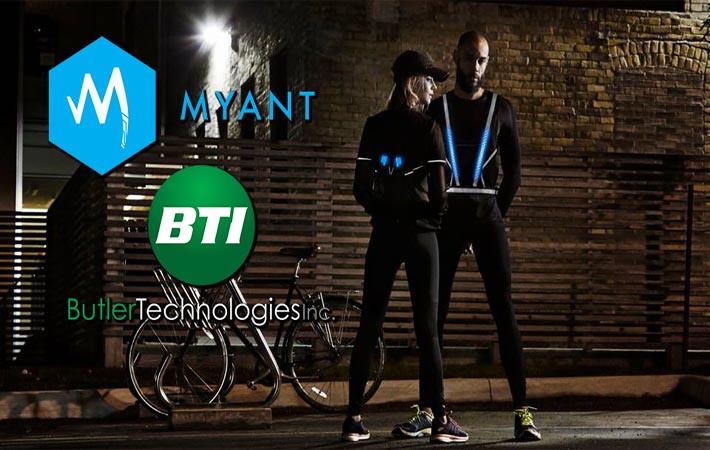Toronto-based Myant, a leader in design, development, and production of textile computing products, and Butler Technologies (BTI), a Pittsburgh-based developer and manufacturer of printed electronic solutions, are collaborating for the advancement of textile computing through Butler’s participation in Myant’s Digital Textile Factory initiative.
The two have also signed a licensing agreement for Myant’s wearable electro-luminescent (EL) lamp technology.Toronto-based Myant, a leader in design, development, and production of textile computing products, and Butler Technologies (BTI), a Pittsburgh-based developer and manufacturer of printed electronic solutions, are collaborating for the advancement of textile computing through Butler's participation in Myant's Digital Textile Factory initiative.#
Myant’s patented EL lamp technology emits light visible under any weather conditions and from any angle. More visible than LED light in inclement visibility, Myant’s EL technology shines a blue light, the colour the human eye registers first, to make the wearer as visible as possible. This technology builds on a naturally occurring phosphor powered by a small power source and is completely washable and flexible.
In addition to the technology licensing agreement, BTI will join Myant’s Digital Textile Factory initiative as a trusted expert on printed electronics. This initiative is a hallmark of Myant’s commitment to renewing the culture of manufacturing in North America, and BTI’s participation will bring its demonstrated expertise in developing and manufacturing printed electronic solutions for wearables to this textile computing network.
Ilaria Varoli, executive vice president of Myant, notes that “Our collaboration with Butler Technologies is a strong example of our efforts to develop a distributed model of advanced manufacturing in North America, one that will help recreate the culture of ‘making’ right here at home.” Myant has been investing in the development of a valuable portfolio of technologies and intellectual property related to textile computing, printable electronics and electroluminescent lighting applications since 2010. Varoli adds, “Having Butler Technologies enrolled in our Digital Textile Factory network brings their recognised leadership and demonstrated capabilities and expertise with respect to printed electronics to our Digital Textile Factory initiative. We are thrilled to work with them on these initiatives.”
Nadine Tripodi, president and owner of BTI concurs. “This partnership with Myant offers BTI a great opportunity to build on our 30-year history of working at the leading edge of new technologies, and with leading global brands. This partnership will extend our established expertise in functional printing and printed electronics into new applications, notably as they relate to textile computing and its application in military, industrial, medical, apparel and other industries. Collaboration with Myant is an exciting opportunity to add to the diversity of solutions BTI can offer – and to add more ‘things we make’ here in North America.”
Future collaboration between Myant and BTI will likely include the installation of a Myant Digital Textile Factory in the Pittsburgh area. Doing so will provide the foundation for the development of an ecosystem for textile computing and printed electronics in Pennsylvania with significant opportunities for research collaboration with post-secondary institutions as well as opportunities for start-ups and other industry players to participate. This is one of a number of other Digital Textile Factories that will be built as part of a roll-out plan to democratise manufacturing while keeping it local. Textile computing solutions apply to industries including military, aerospace, automotive, healthcare, health and safety, performance apparel, and more.
The Digital Textile Factory will give entrepreneurs, innovators and established industry players access to a virtual factory for ideation, research and development, access to yarns and connectors, and design and manufacturing at scale. In so doing, this initiative will propagate and democratise advanced manufacturing techniques and access to the most advanced textile computing machinery in the world. The Digital Textile Factory will also help establish export standards related to textile computing and its use as a platform across industries. (SV)
Fibre2Fashion News Desk – India

